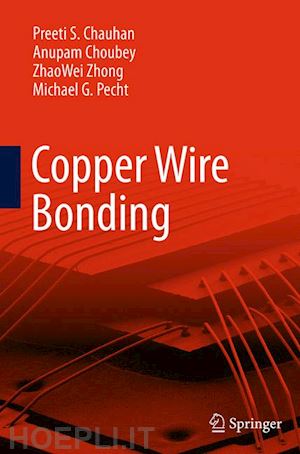

Questo prodotto usufruisce delle SPEDIZIONI GRATIS
selezionando l'opzione Corriere Veloce in fase di ordine.
Pagabile anche con Carta della cultura giovani e del merito, 18App Bonus Cultura e Carta del Docente
This critical volume provides an in-depth presentation of copper wire bonding technologies, processes and equipment, along with the economic benefits and risks. Due to the increasing cost of materials used to make electronic components, the electronics industry has been rapidly moving from high cost gold to significantly lower cost copper as a wire bonding material. However, copper wire bonding has several process and reliability concerns due to its material properties. Copper Wire Bonding book lays out the challenges involved in replacing gold with copper as a wire bond material, and includes the bonding process changes—bond force, electric flame off, current and ultrasonic energy optimization, and bonding tools and equipment changes for first and second bond formation. In addition, the bond–pad metallurgies and the use of bare and palladium-coated copper wires on aluminum are presented, and gold, nickel and palladium surface finishes are discussed. The book also discusses best practices and recommendations on the bond process, bond–pad metallurgies, and appropriate reliability tests for copper wire-bonded electronic components.
In summary, this book:
Copper Wire Bonding is an essential reference for industry professionals seeking detailed information on all facets of copper wire bonding technology.
Preeti Chauhan is a researcher from the Center for Advanced Life Cycle Engineering at the University of Maryland. She is currently a technology development Q&R engineer at Intel Corporation.
Anupam Choubey is a consultant in the area of packaging engineering in the Boston, MA area.
ZhaoWei Zhong is a Professor of Mechanical and Aerospace Engineering at Nanyang Technological University.
Michael Pecht is a world renowned reliability engineer and educator. He is the founder and Director of CALCE (Center for Advanced Life Cycle Engineering) at the University of Maryland.











Il sito utilizza cookie ed altri strumenti di tracciamento che raccolgono informazioni dal dispositivo dell’utente. Oltre ai cookie tecnici ed analitici aggregati, strettamente necessari per il funzionamento di questo sito web, previo consenso dell’utente possono essere installati cookie di profilazione e marketing e cookie dei social media. Cliccando su “Accetto tutti i cookie” saranno attivate tutte le categorie di cookie. Per accettare solo deterninate categorie di cookie, cliccare invece su “Impostazioni cookie”. Chiudendo il banner o continuando a navigare saranno installati solo cookie tecnici. Per maggiori dettagli, consultare la Cookie Policy.